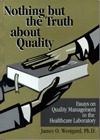Trends
Cooking the books: Does it happen in the laboratory?
- What about laboratory testing?
- An example - Glucose and the new ADA/HSS guidelines
- What quality is required?
- What factors contribute to variability and reliability?
- What CV, bias and QC are needed?
- Are current methods and QC adequate?
- Are we being accountable?
- References
July 2002
The year 2002 will probably be remembered for the scandalous and unethical conduct of American businesses. After many years of government deregulation, there is mounting evidence that business - left on its own - will do what is necessary to make money, with little regard for right and wrong and rules and regulations. Enron, Waste Management, Arthur Andersen, Tyco International, Adelphia Communications, Computer Associates, Global Crossing, WorldCom - there is a growing list of companies being investigated for misstating their earnings. Others, such as Xerox and Qwest Communications, have restated their earnings in the hope of avoiding investigation. Insider trading and other unethical practices expand the list further - Merrill Lynch, Genentech, Imclone, even Martha Stewart. HMO's are even being investigated for racketeering.
So much for a kinder and gentler government that depends on accountability from business. Business has not been accountable. In fact, accounting has been the big problem! Businesses have been "cooking the books" by hiding expenses and enhancing earnings. Here's what Business Week had to say in an editorial in its July 8, 2002 issue [1]:
"The June 25 admission by telecom giant WorldCom Inc. that it had cooked its books to the tune of at least $4 billion could not have come at a worse time for the economy and for the stock market. Even before the WorldCom news came out, the S&P 500-stock index had already fallen by 15% this year. The dollar was declining against the yen and the euro, consumer confidence was weakening, and fears were building that the recovery would be weaker than expected."
The public can no longer trust corporate financial statements! The net result is that the market is becoming unstable, small investors are retreating, foreign investors are withdrawing, the American dollar is falling, and foreign governments are questioning whether the American enterprise system is really the model for guiding their own development. The government's "hands off" attitude that began in the 80s has culminated in businesses now being "out-of-control."
What about laboratory testing?
There has also been a softening of government enforcement of laboratory regulations over the last decade. The fact that the CLIA-88 regulations have not yet been finalized (as of July 2002), that FDA clearance of the manufacturer's recommended QC has never been implemented, that electronic QC has been approved as a substitute for real QC, that home-testing products have been approved for tests that can't be adequately managed in the laboratory - these are but a few examples of our kinder and gentler government allowing the business sector more flexibility and less accountability.
But, business is not alone! We, as laboratory professionals, share the blame. We also have been cooking the books, avoiding the reality of what is necessary to implement reliable testing processes, sometimes misstating or misinterpreting the "error budgets" that are used to manage the quality of laboratory tests. We have been willing to accept the CLIA's minimum QC requirements as maximums in order to reduce costs. We have been willing to accept manufacturer's QC recommendations that are clearly inadequate in order to keep things simple (such as electronic QC for near patient testing). We have been less than reliable in developing recommendations and guidelines for laboratory testing that protect the public from bad results.
 We invite you to read the rest of this article
We invite you to read the rest of this article
This complete article and many more essays can be found in the Nothing but the Truth about Quality manual, available in our online store. You can also download the Table of Contents and additional chapters here.